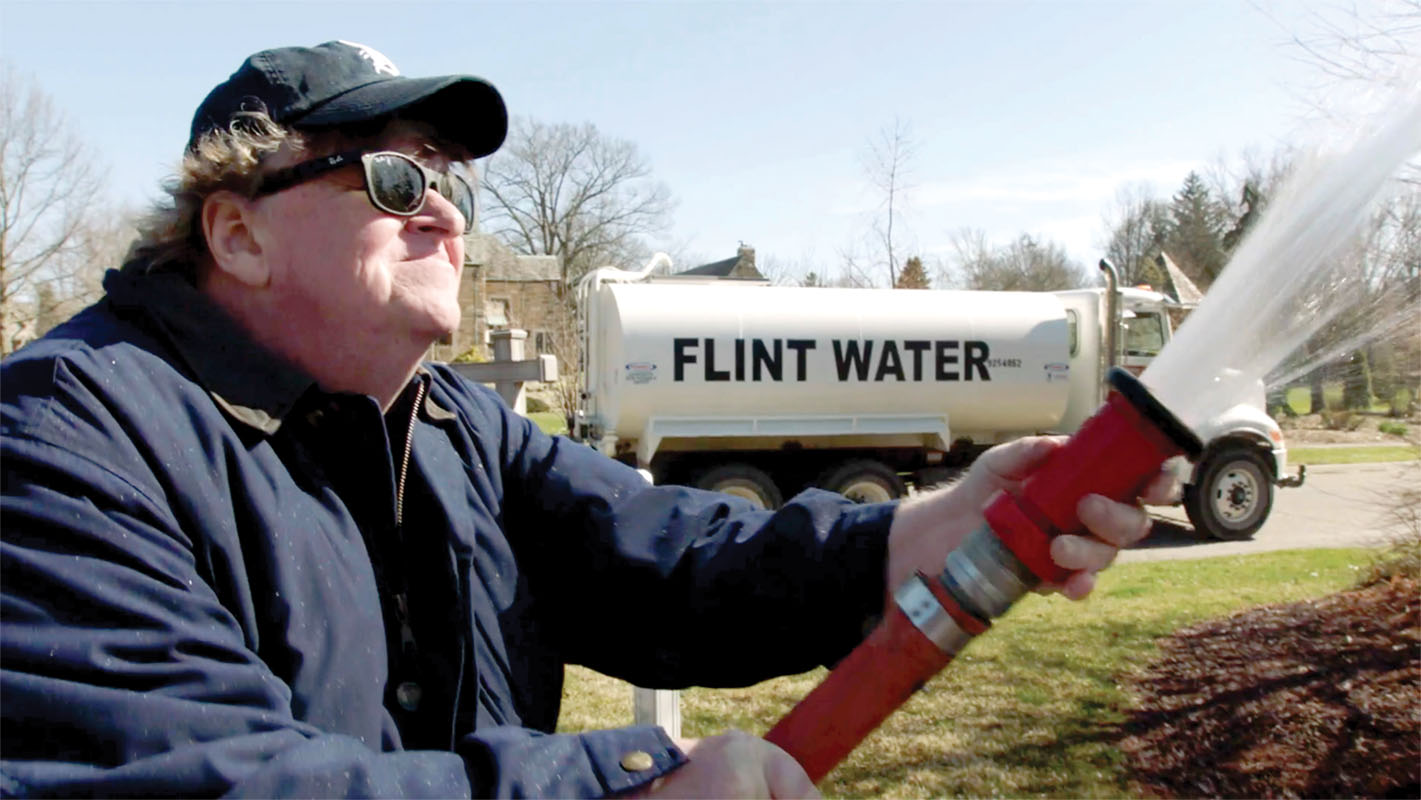We maybe forget that 2004's Fahrenheit 9/11, Michael Moore's attempt to take the American national temperature in the wake of the Twin Towers attack, was A Very Big Thing Indeed in its moment: a politically charged provocation - handed the Cannes Palme d'Or by Quentin Tarantino's jury - which also surpassed In Bed with Madonna at the global box-office to reposition the documentary as potential summer blockbuster. We may also have forgotten that, however superlative Moore's rabblerousing was there, Fahrenheit 9/11 failed in its director's stated aim to stop then-President George W. Bush from winning a second term in office. After a brief flirtation with ObamaHope™, we've all come out the other side; and political stunts designed to overturn the status quo have given way to a moment when stunt politics - big red buses, bright red caps - have become the status quo. So Moore flips the title of his previous film for the sequel Fahrenheit 11/9, the better to reflect the date Donald Trump became President, and to represent our suddenly through-the-looking-glass reality. No surprise that he should find himself with an even bigger fight on his hands.
Bush, as targets for satire go, constituted a representative of the old guard - the kind of "politics as usual" subsequent incumbents would explicitly define themselves against. Trump, by contrast, represents new money, that new, toxic strain of late capitalism that has succeeded in poisoning the political water table - literally so in Moore's native Flint, where the switching of the town's water supply has left its mostly black residents without amenities for the best part of the past three years. There is much in the new film that qualifies as discomforting or angering: Trump's relationship with his daughter, the sight of children in Flint developing pronounced, preventable skin rashes, or at the border being snatched away from their parents, thugs in MAGA hats accosting and assaulting black protesters. The difference between the old corruption and the new, Moore argues, is that it's no longer a covert backroom matter but out there in plain sight, visible at the rallies and in the streets, as apparent to the neutral observer as turning on a tap in Flint. What, then, to do about it?
That American citizens voted for Trump - as they have done for any number of tacky reality-TV "characters" - suggests a failure of multiple systems (the media, in failing to counter fake news; education, in failing to foster critical thinking; democracy, in failing to stave off outside influences), and we find Moore, like so many of us, struggling to get his head around it all; he's like a surgeon faced with a patient bleeding from multiple orifices simultaneously. He still has some wickedly mischievous tricks to fall back on, if blowing raspberries at a tumour is likely to have any effect. He's enough of an editor to venture a newly despairing, even chilling recap of election night itself, as Hillary's anthemic "Fight Song" begins to sound hopelessly empty, and Trump's witching-hour march to victory gets cut to Satanic murmurations. The Flint sections - marking a homecoming of sorts, three decades after Roger & Me - do a diligent job of rounding up useful-to-damning info that hasn't been widely shared inside the US, let alone beyond it; and the student walkouts in the wake of the Parkland massacre chime with Moore's youthful (his critics would doubtless insist childish) love of rebellion. When pushed, this filmmaker is capable of lucid social analysis: the film senses the dire need on the Left for a voice that can articulate the progressive cause with the unequivocal forcefulness of those on the Right. Those students are centred as one such beacon of hope; the suddenly ubiquitous Alexandra Ocasio-Cortez another; the Corbyn-like figure of Bernie Sanders, evidently a Moore favourite, another still. Viewers will have to pick and choose, as we still can in a democracy.
The trouble is that the sudden spread of rot through the American political system forces Moore to move around a lot; Fahrenheit 11/9 is an engaging watch, but it's also an essay-film that demonstrates how the centre has shifted/eroded by having no real centre of its own. One of the problems with our current rolling news cycle is that as one fact is introduced into the public domain, an older one recedes in or disappears from the memory altogether. (Could this be why polls suggest some people are starting to forget the Holocaust? It's hard enough remembering what our own tyrants got up to last week.) For long stretches in Fahrenheit 11/9 where Moore is off pursuing some new line of thought, Trump is allowed to vanish from one's mind and gaze, which isn't an entirely unpleasant phenomenon, but this dude's bad enough on camera; you dread to think what he's doing when nobody's looking. After the sequel's relative commercial disappointment (it took a twentieth of its predecessor's haul at the US box office), Moore announced that his next project would be a revival of his groundbreaking magazine series TV Nation, an acknowledgement that the playing fields have changed, much as Alex Gibney - the cooler head who took over as American cinema's most prominent political documentarian - made upon signing with Netflix to produce last year's excellent Dirty Money. That revival now looks to have been put on ice indefinitely, which strikes me as disappointing. It's far from fashionable to admit it, but we still need filmmakers like Moore to organise the morass of information (and misinformation) being thrown at us on a daily basis; serial television might have allowed him the time to thin out this material and go at the burning issues with greater precision and depth. Trump, for his part, is going nowhere for the time being.
Fahrenheit 11/9 is now available on DVD through Vertigo Releasing.

No comments:
Post a Comment